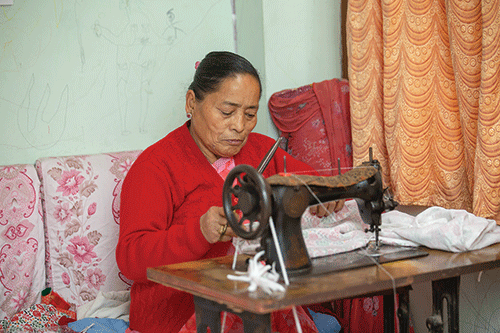
An aquarium with fishes swimming gracefully inside, brings tranquility to your living room. A growing number of Nepali people have started keeping them in their homes. So it seems, there is a growing market for exotic fishes. An English teacher of Paragon School started breeding Angelfish and got hooked. Mark Edmonds, who grew up in Calcutta, came to Kathmandu twenty years ago, married a Nepali girl and has been living here ever since. Ten years ago, he started fish breeding and has never looked back. “Once you start talking about fishes, you can’t stop,” admits Mark. He also has a huge affection for dogs, but says they occupy too much space and of course his obsession is fishes. Extremely knowledgeable about this unusual passion, he breeds about 5000 to 5,500 fishes a month in one of the rooms in his house.
While teaching at the Galaxy School, Mark met Kripan Sarkar, another teacher who became a good friend. Sharing a common affection for fishes, they got together and bought eight Angelfishes each at a fish shop in Lainchowr. “ Two fishes survived out of the eight, half the eggs of which went bad. The rest hatched and I fed them egg yolk,” reminisces Mark. By 1989, he had finally managed to breed 150 baby fishes and from there he was on his way. Now his fishes are exported to India, China and Bangkok. Sometimes, a passionate person energizes the others, and we were going to and fro, caught up in his enthusiasm. It’s no hobby; Mark carries out experiments and makes his own equipment like filters. He enjoys cross-breeding and says, “It’s very interesting what you can come up with.”
The species he is currently breeding are Yellow head Koi, Blushing Angels, Marvel Angels, Catfish and snails too. “Snails eats up the algae in the aquarium and make it clean,” explains Mark, sensing our uneasy reaction to snail breeding. “After Dashain, I am planning to breed Rami Rezi’s which is in great demand in Nepal,” reveals Mark. His latest breed is the nameless hybrid of Marvel and Black. It’s a rarity and the difficulty in breeding hybrids make them special. The fry (baby) of the Marvel and Black possess both its parent’s attributes and silver little kois as he calls them, are found swarming in hundreds.
“Nepal is the best place for breeding goldfishes,” says Mark, “as goldfish survive in cold water.” Mark believes Nepal has great scope for fish breeding. “Rare fishes are found in the marshy land near the Koshi Barrage. The Government should open a collection center and employ the locals to collect those fishes,” Mark informs. Such rare fishes are being utilized by Indian fisheries when we can export them ourselves. He thinks that fishes can be bred in the terai in Nepal throughout the year.
Mark talks on the fundamentals of keeping fish as pets. “The three important factors affecting their growth are protein, temperature and water.” For a personal aquarium, it should be 3 ft and above, and Mark pleads to people not to keep fishes in bowls. In a bowl all the excretions make the water polluted and kills the fish. Another aspect Mark highlights is that for the fishes bred here, one can change the water in the tank many times, but imported fishes are delicate as they are used to their own climate.
According to Mark, the incubation period for Angelfish is three days. The male clears the spot for egg laying and the female hatches them with what looks like small air bubbles stuck together. “They grow big in about 20 days, depending upon the protein diet. While the goldfish will eat anything, it is very essential to know the varied temperature and food type for various other fishes,” informs Mark.
Talking to Mark, who supplies fishes to numerous shops in Kathmandu, one realizes that he is content, and thoroughly enjoys what he is doing — breeding the thousands of fishes in his small room. He is also working closely with the Balaju Fishery Department, where a project is underway to build a breeding ground (hatchery). Mark plans to find a bigger plot for breeding his fishes. With his passion and energy, Mark Edmonds’ enterprize will surely be a big success.











